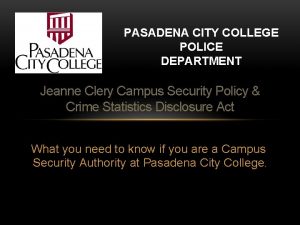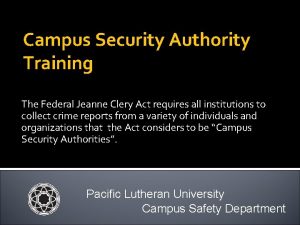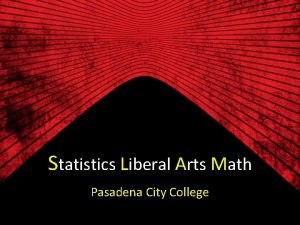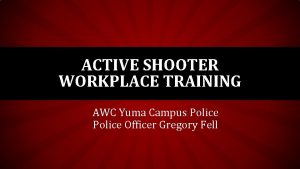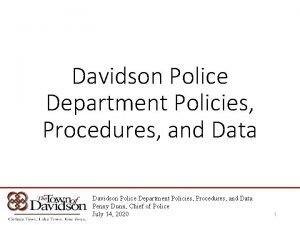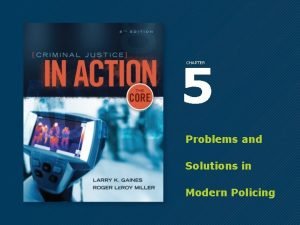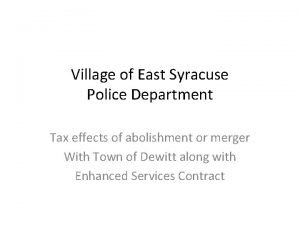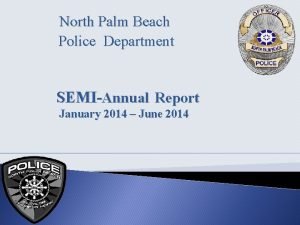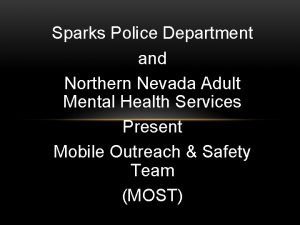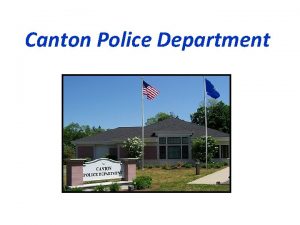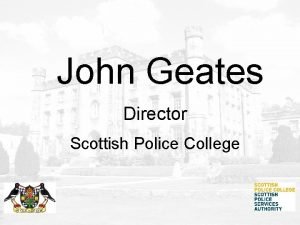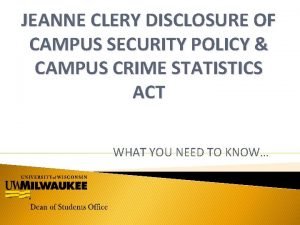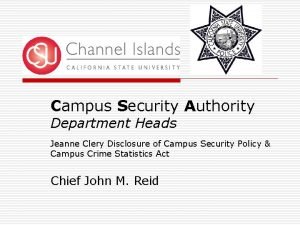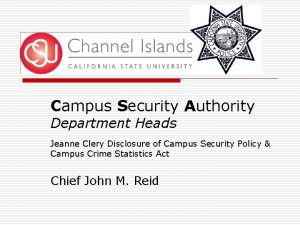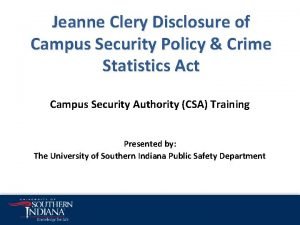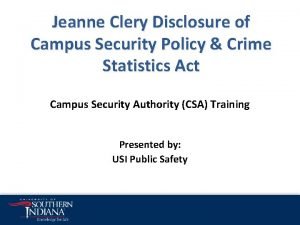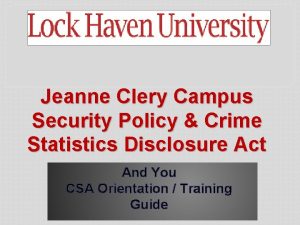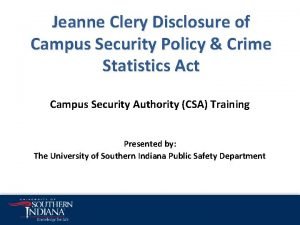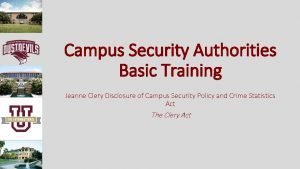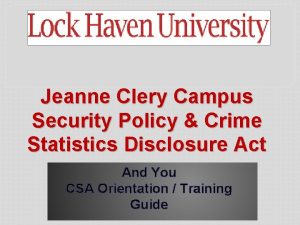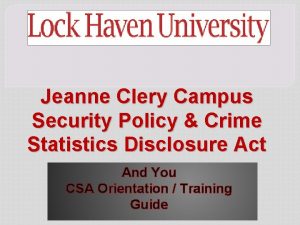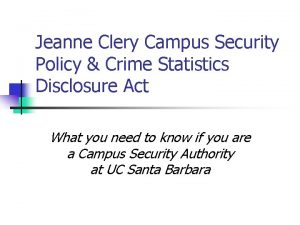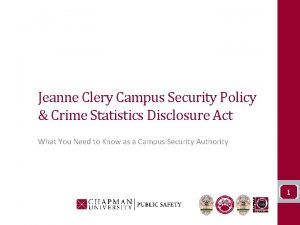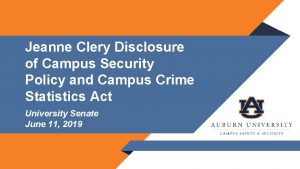PASADENA CITY COLLEGE POLICE DEPARTMENT Jeanne Clery Campus






































- Slides: 38

PASADENA CITY COLLEGE POLICE DEPARTMENT Jeanne Clery Campus Security Policy & Crime Statistics Disclosure Act What you need to know if you are a Campus Security Authority at Pasadena City College.

CLERY ACT? WHAT’S THAT? • Jeanne Clery was raped and murdered in her dorm room at Lehigh University in 1986. The law enacted in her memory is intended to ensure that students and others are informed about violent campus crimes so they can make informed decisions. • The Clery Act requires that universities and colleges report crime statistics to current and prospective students and employees.

BUT WHAT DOES IT HAVE TO DO WITH YOU? • Many crimes, especially sexual assaults, are not reported to police. • The Clery Act requires that we gather and publish crime data to ensure that students and others know about dangers on campus. • Data is collected from a wide variety of “Campus Security Authorities”; that’s where you come in.

WHAT MAKES YOU A CAMPUS SECURITY AUTHORITY? The law defines four categories of Campus Security Authority: � College Police � Non-police security staff responsible for monitoring University property � People/offices designated under our policy as those to whom/which crimes should be reported � “Officials with significant responsibility for student and campus activities” – that’s you!

DESIGNATED STAFF/UNITS TO WHOM CRIMES SHOULD BE REPORTED: v For emergencies & crimes-in-progress: Call 9 -1 -1 v For non-emergency situations, report crimes to: Ø Campus Police: (626) 585 -7484

HOW DID YOU GET TO BE A CAMPUS SECURITY AUTHORITY? • The last category of “Campus Security Authority” (or “CSA”) is defined broadly to ensure complete coverage and thorough reporting of crimes. • Many PCC staff and faculty members are CSA’s having “significant responsibility for student and campus activities” – including you.

EXAMPLES OF: “CAMPUS SECURITY AUTHORITIES” Deans, Athletic Coaches, Student Ø Activities Coordinators, Student Affairs Officers and Faculty Advisors to Student Organizations. Defined by function, not title: • § Significant responsibility for student AND campus activities § Contact with students

WHO ISN’T A CAMPUS SECURITY AUTHORITY? � Administrative staff are not responsible for students (e. g. , payroll, facilities) � Clerical staff � Individual faculty who do NOT serve as an advisor to a registered student organization � Doctors in the Student Health Center, or Counselors in the Counseling Center, who only provide care to individual students

WHO IS EXEMPT FROM REPORTING REQUIREMENTS? • Licensed professional mental health counselors. • Pastoral counselors (employed by a religious organization to provide confidential counseling). • Who are working within the scope of their license or religious assignment at the time they receive the crime report.

CONFIDENTIAL REPORTING OPTION: � PCC encourages professional and pastoral counselors, although not required to report crimes, to tell victims about the Confidential Reporting Process -The counselor must make a judgment call: is it appropriate to discuss crime reporting in this particular situation? � Confidential Reporting Process: victims can report crimes confidentially (no names or criminal investigation) to be included in crime statistics.

SO YOU’RE A CSA, WHAT DO YOU HAVE TO DO? § If someone tells you about a crime or an incident that may be a crime, you must record the information and submit a report. o Just get the facts, experts will do the analysis. When in doubt, report it! Questions? Contact the Campus Police. Ø Chief: Stanton H. Perez (626)-585 -7486 shperez@pasadena. edu

WHAT DO YOU HAVE TO REPORT? These crimes must be reported: � Criminal homicide � Sex offenses, forcible & non-forcible � Aggravated assault � Robbery � Burglary � Motor vehicle theft � Hate crimes, including any of the seven crimes listed above, or any other crime causing bodily injury, if motivated by hate � Liquor, drug, and weapons – both arrests AND disciplinary referrals

TIMING IS CRITICAL: Be sure to document: • When the crime or incident occurred and • When it was reported to you Ø The law requires that the crime be reported for the calendar year in which it was first reported to a Campus Security Authority not when it occurred, not when it was reported to police.

LOCATION, LOCATION! A crime must be reported if it occurred: • On campus • On public property adjacent to campus • On certain off-campus property

LOCATION (CONTINUED) § Under the law, some off-campus locations are deemed so closely related to the University that crimes occurring at those locations are included in campus crime statistics. Examples: Crimes occurring at student organization properties and at College-owned or controlled facilities “frequently used by students”

LOCATION (CONTINUED) Ø These off-campus properties are termed “noncampus property, ” defined by law to include: �Property owned or controlled by PCC �Property owned or controlled by a student organization registered with PCC �Public property adjacent to campus (e. g. roads, parking lots, sidewalks)

DON’T INCLUDE CRIMES NOT CONNECTED TO PASADENA CITY COLLEGE For example: � A student tells you about a crime that occurred at a different college before he transferred to PCC; or � A student reports an assault that happened while she was away from campus and not involved in a campus activity. (e. g. , at home on spring break, on vacation, or at a summer job with a private company)

BUT DO TELL THE STUDENT ABOUT REPORTING OPTIONS AND REFER FOR HELP: For example: A student tells you that she was raped by another student at her off-campus apartment. Although the crime did not occur at a location covered by Clery reporting, the accused student IS subject to University disciplinary action for this off-campus conduct. In addition, the victim is eligible for campus assistance and resources.

JUST GET THE FACTS: � Police will categorize the report: your job is to get the information the person is willing to tell you Remember: �You are not a detective �You don’t have to prove what happened or who was at fault, or classify the crime �You aren’t supposed to find the perpetrator � Use the report form, but DON’T identify the victim UNLESS she/he gives permission

DESCRIBE OPTIONS: • Let the person know about options for reporting to police. • BUT: The decision isn’t yours, a person who talks to you may not want to talk to police and doesn’t have to.

OFFER REFERRALS TO CAMPUS AND OTHER RESOURCES, INCLUDING: § Campus victims’ assistance programs for sexual assault and other crimes § Available medical treatment § Counseling services for students and staff Information packets are available from: Pasadena City College 1570 E. Colorado Blvd Pasadena, CA 91106 -2003

DOCUMENT & REPORT THE FACTS: � Complete a Crime Report Form � If the person does NOT want to report to police, inform her/him that you MUST report the incident as an anonymous statistic, but will not identify anyone involved. – you may need to wait until the reporting party leaves…

FILLING OUT THE CRIME REPORT FORM: Ø Describe the incident or crime § Answering questions on form will help police determine correct category. § Get as accurate and complete a description of what happened as you can. § Even incomplete information can help.

THE QUESTIONS: � Is a violent crime in progress? (If so, call police immediately at 9 -1 -1) � Has the victim sought or is the victim in need of assistance/services? � What happened? How, when, and where did it happen? Is there an identified suspect? � Has the incident been reported to police or to another CSA? � Does the victim wish to remain anonymous?

FILLING OUT THE FORM: YOU’RE NOT THE EXPERT AND YOU DON’T HAVE TO BE � You don’t have to be a criminal lawyer or know the classification. � Just indicate the crime that seems most likely or possible. � The experts (the Police) will make the final determination and classify the crimes.

FILLING OUT THE FORM: THE CRIMES Ø Criminal Homicide: murder, non-negligent manslaughter, and negligent manslaughter (including vehicular manslaughter) Ø Aggravated Assault: unlawful attack upon another with intent to inflict severe injury, using weapon or means likely to produce death or great bodily harm

FILLING OUT THE FORMS: THE CRIMES Ø Sex Offenses, forcible and non-forcible • Forcible sex offenses: rape, sodomy, sexual fondling, sexual assault with object • Non-forcible: statutory rape and incest Ø Questions on Sex Offenses • Was crime committed forcibly/against victim’s will? • Was victim incapable of giving consent because of temporary/permanent mental/physical incapacity, or because underage? • Was assault facilitated by giving drugs/alcohol?

FILLING OUT THE FORM: THE CRIMES Ø Robbery • Taking/attempting to take something by force, violence, threat, or by putting victim in fear Ø Questions on Robbery • Was force or a weapon used or threatened? • Was victim injured? • Did victim feel fearful, threatened or endangered?

FILLING OUT THE FORMS: THE CRIMES Ø Burglary • Unlawful entry into a structure to commit a felony or theft Ø Questions on Burglary • Was item taken from inside classroom, office, store, lab, or other structure? • Was structure, room, store, or office open, closed, or locked? • How did thief get into the structure/ room etc. ?

FILLING OUT THE FORM: THE CRIMES Ø Motor vehicle theft: theft of automobiles, trucks, etc. , including “joyriding” (taking by person without lawful access) Ø Arson: willful or malicious burning/attempt to burn structure, vehicle, or personal property of another

FILLING OUT THE FORM: THE CRIMES Ø Hate crimes: any of the above crimes, or any other crime causing bodily injury (e. g. simple assault) where there is evidence of both: • Hate motivation, and • That the victim was selected because of actual/perceived race, gender, religion, national origin, disability, or sexual orientation

FILLING OUT THE FORM: THE CRIMES Ø Hate crimes to property, questions: • Was the target personal property, a personal residence, house of worship, or ethnic organization? • Did the incident involve any expression of hatred (e. g. graffiti, comments) re: race, gender, ethnicity, religion, sexual orientation, or disability? • Did any personal injury result from the incident? *Report ANY vandalism to property of a religious, ethnic, gay or lesbian organization as a hate crime

FILLING OUT THE FORM: THE CRIMES Ø Liquor, drug, and weapon law violations: • Police report statistics on arrests for liquor, drug, and weapon-related crimes • Student Affairs reports statistics on disciplinary referrals for drug, liquor, and weapon law violations (except when the student was also arrested for the same act) • Statistics must reflect number of persons involved (head count), not just number of incidents

PRACTICAL GUIDANCE: � WEAPON LAW VIOLATION – The violation of laws or ordinances dealing with weapon offenses, regulatory in nature, such as: manufacture, sale or possession of deadly weapons. Practical guidance: Report arrests and disciplinary referrals for any violation of a law regulating weapons. � DRUG ABUSE VIOLATION – Violations of state and local laws relating to the unlawful possession of sale, use, growing, manufacturing, and making of controlled substances. Practical guidance: Report arrests and disciplinary referrals for any violation of a law regulating drugs, regardless of the type of drug.

PRACTICAL GUIDANCE � LIQUOR LAW VIOLATION – The violation of laws or ordinances prohibiting the manufacture, sale, transporting, furnishing, possessing of intoxicating liquor; maintaining unlawful drinking places; furnishing liquor to a minor or public intoxication. Practical guidance: Report actual arrests and disciplinary referrals for violation of the liquor laws listed in the definitions. Do not report arrests or referrals for liquor offenses that violate College policy but do not break the law. For example, do not report a referral of a student who is of drinking age but has violated a PCC policy against drinking on campus.

PCC EMPLOYEE REQUIREMENT: • Requirement includes responsibility for collecting and reporting aggregate data on referrals of employee disciplinary actions related to incidents while on the job. These include “liquor law violations, drug law violations, and illegal weapons possession. ” Those who are able to address this requirement on employee data collection and reporting include the campus’ Human Relations Manager, or locally designated person with employee relations responsibilities for staff, and the Academic Personnel Director, or locally designated person with employee relations responsibilities for academic employees.

REPORTING TIMELINE: Ø Quarterly reporting only if you have crimes in that quarter. Nov 30, 2012 DUE for 3 rd quarter 2012 Jan 30, 2013 DUE for 4 th quarter 2012 Apr 30, 2013 DUE for 1 st quarter 2013 Aug 31, 2013 DUE for 2 nd quarter 2013 Ø Annual Report: You must send the form in even if you have nothing to report. March 1, 2013, is the absolute deadline for 2012 reporting year. Ø If you report all CLERY crimes each quarter do not duplicate the crime reporting on the annual report. MARK THE ANNUAL FORM: ALL CRIMES HAVE BEEN REPORTED QUARTERLY.

HELP IS AT HAND: Ø For Clery Act information visit: - Campus Police Statistics website: http: //www. pasadena. edu/police/crimestats. cfm - Clery Manual website: http: //www 2. ed. gov/admins/lead/safety/handbook. pdf Ø Questions? Contact the Campus Clery Act Coordinator at: (626) 585 -7484
 Pasadena city college police department
Pasadena city college police department Plu campus safety
Plu campus safety Pasadena city college pathways
Pasadena city college pathways Pasadena city college statistics
Pasadena city college statistics Pasadena city college dean
Pasadena city college dean Clery act training
Clery act training Pasadena planning department
Pasadena planning department Awc campus police
Awc campus police Bloomington indiana police department
Bloomington indiana police department New canaan police department
New canaan police department Lathrup village police department
Lathrup village police department Huntersville town billboards
Huntersville town billboards Palm coast police department
Palm coast police department Backbone of police department
Backbone of police department Davidson police department
Davidson police department Chain of police department
Chain of police department East syracuse police department
East syracuse police department North palm beach police department
North palm beach police department Mobile outreach safety team reno
Mobile outreach safety team reno Mille lacs police department
Mille lacs police department San mateo police department jobs
San mateo police department jobs Canton police officers
Canton police officers Little elm police department
Little elm police department Umass lowell police department
Umass lowell police department San diego continuing education north city campus
San diego continuing education north city campus Norwegian police university college
Norwegian police university college Police academy college point
Police academy college point Police executive leadership college
Police executive leadership college Scottish police college
Scottish police college Ethiopian police university college
Ethiopian police university college Jeanne acton
Jeanne acton Jeanne nollman
Jeanne nollman Jeanne fine
Jeanne fine Jeanne sharbuno
Jeanne sharbuno Jeanne acton
Jeanne acton The city of ember awards
The city of ember awards Jeanne mason
Jeanne mason Testing flexor digitorum profundus
Testing flexor digitorum profundus What family “firsts” did jeanne accomplish?
What family “firsts” did jeanne accomplish?
